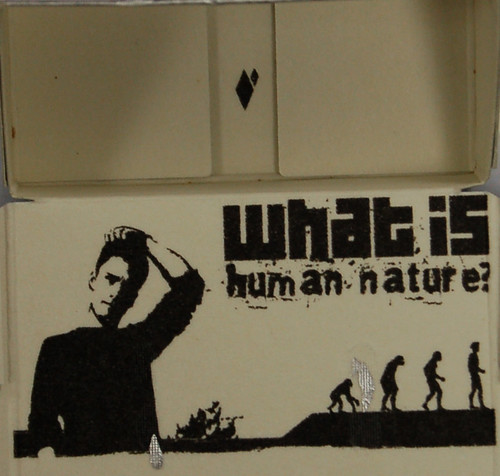 Everyone says that it’s “human nature” to do good things… but is it, really? Believe you me, I’m the type of person who tries to find the good in everything and everyone, but there are just some times when it’s impossible to do. If it’s human nature to do good, why do we all have this strong propensity to do bad things? Is the temptation just too much to deal with, so we have to give in? Or is it that we really do want to do bad, but we just stifle those wants and desires because we know they’re not right?
Everyone says that it’s “human nature” to do good things… but is it, really? Believe you me, I’m the type of person who tries to find the good in everything and everyone, but there are just some times when it’s impossible to do. If it’s human nature to do good, why do we all have this strong propensity to do bad things? Is the temptation just too much to deal with, so we have to give in? Or is it that we really do want to do bad, but we just stifle those wants and desires because we know they’re not right?A friend of mine, when asked the question, told me that he thinks it’s human nature “to do whatever it takes to survive (i.e. kill, eat another person, whatever)”. I’d like to think this isn’t true, yet to some degree I know it is. This world we live in isn’t called a “dog eat dog” world for nothing.
He also brought up another point - we all have different views on what is bad. How can our society, which seems to know right from wrong, have such differing views? For example: down South (back in the day) it was perfectly alright, to some extent, for someone to lynch a black person. Perhaps for no other reason than for the fact that said black person looked at them “the wrong way”. Yet, up North, that would have been completely unacceptable.
Watch Primetime TV today - how many shows, to some extent, glorify murder or drug use? Sure, the murder may have been committed with “good intentions”, but does that make it any more right than, say, a serial killer’s many murders? Do we, as a society, teach our young ones that killing someone really isn’t as bad as the law makes it out to be?
It seems to me that Hollywood may play a major roll in this viewpoint. For example, how many movies can you name that have absolutely no killing or reference to killing someone in it/them (without that movie being labeled a “family movie”)? Now, how many movies can you name that have at least one death from unnatural causes? Is that number larger than the first? Sure, the MPAA tries to shield our children/teens from this type of “entertainment” by giving these movies a PG-13 or higher rating, but what good does that really do?
I remember back when Saving Private Ryan first came out. My sisters and I really wanted to see it, but I wasn’t quite 17. I got into the movie theater with a signed note (yes, the note was authentic) from my parents stating that it was ok for me to see this rated R movie. One thing I remember (probably the only thing) from that experience was seeing grown men (some in their 60’s) crying while watching the war/action scenes. I realize that some of this was because the movie brought back memories that these men had fought for years to suppress. But, now as I look back, I can’t help but remember that not one person under the age of 30 seemed to be bothered by the graphic violence/death scenes. My sisters and I seemed the be the only people under the age of 30 who were visually upset by the slow, painful death of one of the characters when a dagger was very slowly, very deliberately shoved into his heart by a German soldier (who seemed to be performing the act out of revenge - he seemed completely blind to the fact that he was taking a sacred human life). Has modern society become so anesthetized towards death that death only bothers us when it effects us personally?
I’d like to think that my human nature is to do good. But, then again, I don’t really know. There are some days where doing what’s right is the least of my worries. So why do I do what’s right? Because I’m afraid of the consequences. Are consequences the only thing that keep us from killing everyone off? If so, we’re really no different than the animals in the wild. We’ve been given a capacity to love, to know the different of right from wrong. If we, as humans, have been given this precious gift, I’d like to think we’re using it. For the most part, I think we’re doing a good job. But is it because we are truly good or because we’re denying what seems to be this thing called Human Nature?
No comments:
Post a Comment